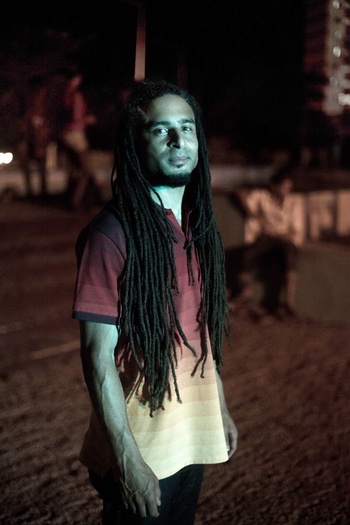At the invitation of DJ Gilles Peterson (of BBC Radio 3), the British dubstep producer Mala travelled to Cuba to record with local musicians. That led to Mala in Cuba, an encounter between age-old Cuban rhythms and hip electronica. “Their ability to understand music and to respond to it is fascinating!”, says Mala.
Mala had never been into Cuban music. So it was more or less chance that brought him to the biggest island in the Caribbean and made his career take a new direction. “I didn’t know much about Cuban music, or about the island’s culture and history,” he recalls. “So I set off with an open mind, prepared to embrace everything the Cubans had to offer.” Gilles Peterson had already had Mala as his guest on a number of occasions for interviews and DJ sets on BBC Radio 3. The goal this time was to give Havana Cultura a new, electronic twist. Havana Cultura is a project in which Peterson
Mala in Cuba: electronica meets Cuban rhythms

surveys today’s Cuban underground music scene, which includes a lot of outstanding hip hop and modern versions of Afro-Cuban music and son, as well as reggaeton and electro.
Mala went with him to Cuba, which resulted in Havana Cultura: The Search Continues, a double album produced by Peterson, and Mala in Cuba, produced by Mala. “A whole lot of leading musicians came along to the studio to record with Gilles. I took the time to get to know their work and then I invited them to record with me too.” This was an entirely new creative process for Mala, who found himself working with musicians for the first time. “It all began with a meeting with Roberto Fonseca [a leading Cuban pianist], one morning over breakfast. At the request of Gilles, Roberto introduced me to fifteen traditional Cuban rhythms. That became the blueprint for the album. Then I went off to my hotel room to study the rhythms and to pick out bits that interested me.” The tracks took shape little by little and Mala invited musicians to record them. “Roberto often came along to record keyboards or strings. And there was Changuito [a legendary Cuban percussionist], too, on timbales. And when Danay [Suarez] heard the beat of “Noches sueños”, she was really keen to sing on it. She had the lyrics ready the very next day!”
Cuba is famous for its outstanding musicians, but Mala was pleasantly surprised by their openness and hospitality. “I got a very warm reception – I immediately felt at home. Communication was difficult sometimes: I don’t speak any Spanish and they don’t speak any English, but the vibe was good, and that means you can get the message across OK. The biggest difference is that their society isn’t plagued by consumption. You’re not surrounded by huge billboards on the streets. I grew up in a big modern city and it was really refreshing not to be bombarded all the time by advertising.”
There may have been no advertising bombardment, but Mala certainly bombarded the Cuban musicians with his beats. “They were amazed by the very heavy, low bass frequency of my music. But they are phenomenal musicians, and very open-minded. Their ability to understand music and to respond to it is fascinating!”
(Photo: Mala © Teddy Fitzhugh)
Autumn Falls: Mala in Cuba • 30/11, 20.30, €13/16, VK*, Schoolstraat 76 rue de l’École, Molenbeek, 02-414.29.07, www.vkconcerts.be
Mala went with him to Cuba, which resulted in Havana Cultura: The Search Continues, a double album produced by Peterson, and Mala in Cuba, produced by Mala. “A whole lot of leading musicians came along to the studio to record with Gilles. I took the time to get to know their work and then I invited them to record with me too.” This was an entirely new creative process for Mala, who found himself working with musicians for the first time. “It all began with a meeting with Roberto Fonseca [a leading Cuban pianist], one morning over breakfast. At the request of Gilles, Roberto introduced me to fifteen traditional Cuban rhythms. That became the blueprint for the album. Then I went off to my hotel room to study the rhythms and to pick out bits that interested me.” The tracks took shape little by little and Mala invited musicians to record them. “Roberto often came along to record keyboards or strings. And there was Changuito [a legendary Cuban percussionist], too, on timbales. And when Danay [Suarez] heard the beat of “Noches sueños”, she was really keen to sing on it. She had the lyrics ready the very next day!”
Cuba is famous for its outstanding musicians, but Mala was pleasantly surprised by their openness and hospitality. “I got a very warm reception – I immediately felt at home. Communication was difficult sometimes: I don’t speak any Spanish and they don’t speak any English, but the vibe was good, and that means you can get the message across OK. The biggest difference is that their society isn’t plagued by consumption. You’re not surrounded by huge billboards on the streets. I grew up in a big modern city and it was really refreshing not to be bombarded all the time by advertising.”
There may have been no advertising bombardment, but Mala certainly bombarded the Cuban musicians with his beats. “They were amazed by the very heavy, low bass frequency of my music. But they are phenomenal musicians, and very open-minded. Their ability to understand music and to respond to it is fascinating!”
(Photo: Mala © Teddy Fitzhugh)
Autumn Falls: Mala in Cuba • 30/11, 20.30, €13/16, VK*, Schoolstraat 76 rue de l’École, Molenbeek, 02-414.29.07, www.vkconcerts.be
Read more about: Muziek
Fijn dat je wil reageren. Wie reageert, gaat akkoord met onze huisregels. Hoe reageren via Disqus? Een woordje uitleg.